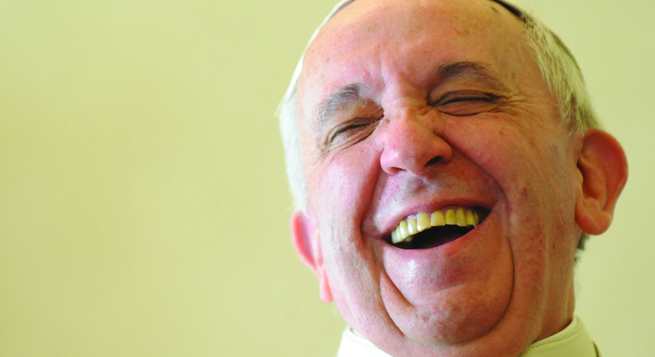A Smile and Joy

Don Carlo de Marchi February 2017
“You can’t proclaim the Gospel with a funeral face.” Pope Francis’ provocative words are not merely a joke, and the idea that Christians shouldn’t appear sad to others isn’t something new. Nietzsche said: “They need to sing a better song to me, if they want me to believe in their Saviour. His disciples need to look like people who are saved.”
But how can we smile when worries, work, small setbacks and great suffering are so frequent in life?
The first smile is the most important one: “May the Lord smile upon you,” the Bible says. And also, “The joy of the Lord is your strength.” God’s smile comes first. The joy with which the Creator contemplates each of his creatures should be the solid foundation of our serenity and peace.
But isn’t it irreverent to think of God, the Lord of the Universe, as smiling? “God’s love for us must be the greater the more we can make him laugh,” says a character in one of Ray Bradbury’s stories. “I never thought of God as humorous,” someone replies. And the first person quickly responds: “The creator of the platypus, the camel, the ostrich, and man? Oh, come now!”
The second smile is that with which I look at myself. Without overlooking my humanity, my limitations, which aren’t necessarily defects and shouldn’t be taken too seriously. My Creator loves me as I am, because if he wanted me to be different, he would have made me different.
“I think it’s very important to be able to see the funny side of life and its joyful dimension and not to take everything too tragically,” Benedict XVI once remarked. “I’d also say it’s necessary for my ministry. A writer once said that angels can fly because they don’t take themselves too seriously. Maybe we could also fly a bit if we didn’t think we were so important.”
Smiling is an act of humility; it means I accept myself and my way of being, remaining where I am with a holy peace. Without taking myself too seriously, because, as G.K. Chesterton said, “seriousness is not a virtue. It would be a heresy, but a much more sensible heresy, to say that seriousness is a vice. It is really a natural trend or lapse into taking one’s self gravely, because it is the easiest thing to do. It is much easier to write a good Times leading article than a good joke in Punch. For solemnity flows out of men naturally, but laughter is a leap. It is easy to be heavy: hard to be light. Satan fell by the force of gravity.”
The third smile is the consequence of the two previous ones. It is the smile with which I welcome other people, especially those with whom I live and work. Showing them affection, without giving too much importance to possible mistakes or frictions. When receiving the Nobel Prize, Mother Teresa of Calcutta, with a joyful smile, surprised the audience with this suggestion of hers: “Smile at each other, make time for each other in your family.”
“The clothing, the smile and the way of walking reveal a person’s heart,” says the Book of Wisdom.
A smile can truly be the sign that enables others to recognize a Christian.
comments powered byDisqus

